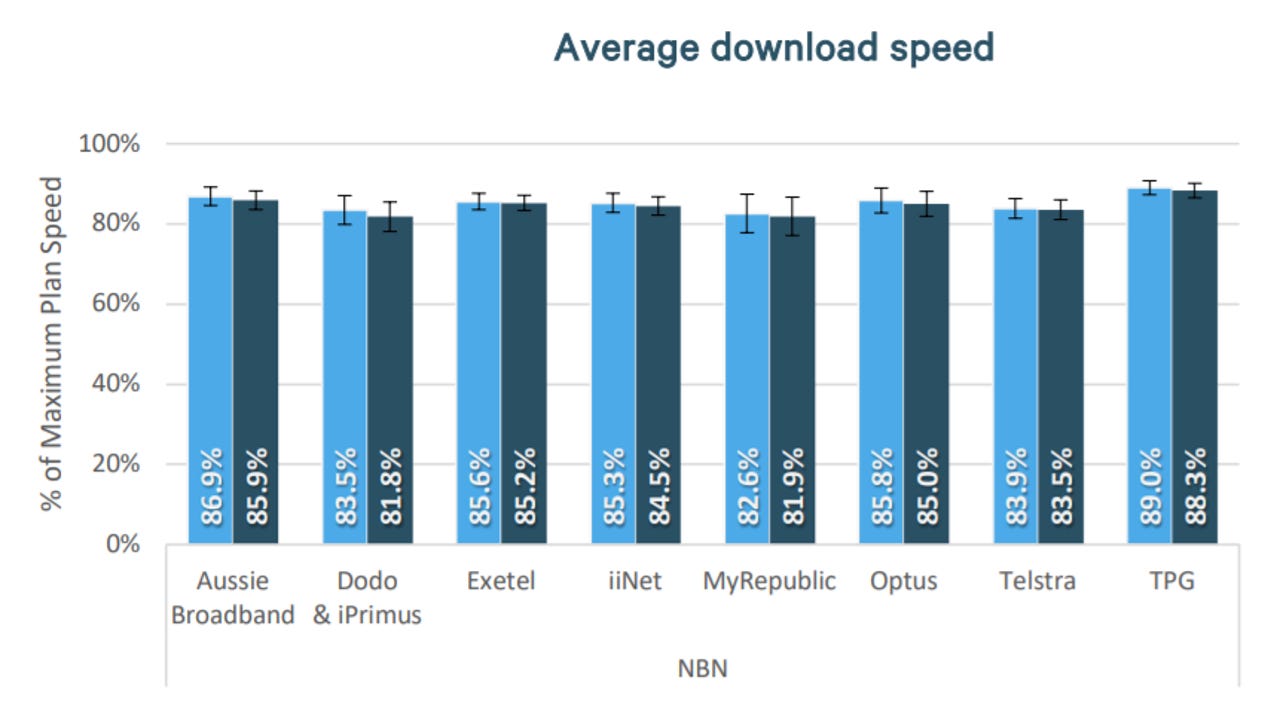TPG is still king of NBN speed report

TPG has claimed first place for the third consecutive time in the fifth broadband speed-monitoring report by the Australian Competition and Consumer Commission (ACCC), delivering 89% of its maximum plan speeds overall and 88% during busy hours for downloads in the first measurements for 2019.
The National Broadband Network (NBN) speed report [PDF], which collected measurements between February 1 and February 28, 2019, saw winner of the second ACCC report Aussie Broadband come in second, providing 87% of maximum download speeds overall and 86% in busy hours; followed by Optus, at 86% and 85%; Exetel, at 86% and 82%; iiNet, at 85% and 84.5%; Telstra, at around 84% for both; and Dodo and iPrimus, at 84% and 82%.
MyRepublic came in last place, delivering almost 83% of maximum plan speeds overall and 82% in busy hours for downloads.

Across uploads, however, Exetel again took out first place by delivering 90% of maximum plan speeds overall, and 89% of maximum plan speeds during busy hours.
Exetel was followed by TPG, which provided 87% and 86% of maximum plan speeds overall and during busy hours, respectively; iiNet, at 86% for both; Dodo and iPrimus, which almost hit 86% for both; Aussie Broadband, at around 85.5% for both; Telstra, at 82%; and MyRepublic and Optus, which both sat at around 81%.
Telstra had the lowest latency this time, with 10.7 milliseconds overall, followed by Exetel with 11.1ms; TPG and Aussie Broadband with around 11.5ms; Optus and iiNet with around 13ms; Dodo and iPrimus at 16ms; and MyRepublic at 17ms.
One new category for the report was daily outages lasting over 30 seconds, which Optus easily took out with a score of 1.5 per day. Exetel was next, on 0.4 per day; Aussie Broadband had 0.3; Dodo and iPrimus and iiNet sat at 0.2, and TPG, Telstra, and MyRepublic experienced the least, with just 0.1 daily outages.
"RSPs need to continue to monitor their networks to ensure their speed claims are realistic, and we expect NBN Co and RSPs to work harder together to help consumers achieve the speeds they are paying for," ACCC Chair Rod Sims said.
"We will be watching to see how companies respond to customers who aren't getting the advertised speeds on their current plans, and we will act on misleading speed and performance claims made by providers."
The ACCC also looked into the proportion of busy hours where a telco's advertised speed was achieved on 50/20Mbps and 100/40Mbps, finding that TPG attained this 83% of the time; Telstra and Optus around 75%; Exetel 70%; and iiNet 64%, with MyRepublic and Aussie Broadband trailing at 37% and 26%, respectively.
For its reports, the ACCC now has 172 whiteboxes on Telstra services, over 150 on Aussie Broadband and iiNet, 126 on TPG, 121 on Optus, around 60 on MyRepublic and Exetel, and 49 on Dodo and iPrimus.
This time, fibre-to-the-premises (FttP) was only slightly ahead of hybrid fibre-coaxial (HFC) in terms of delivering speeds, with the former providing 91% of maximum plan speeds overall and 92.4% upload, and the latter 90.9% download and 91.7% upload speeds overall.
Fibre-to-the-node (FttN) provided 80% and 77% of download and upload maximum plan speeds, respectively.
Shadow Communications Minister Michelle Rowland and Shadow Regional Communications Minister Stephen Jones used these figures to argue that 374,000 FttN premises are not getting the speeds they are paying for.
"Labor has a credible plan to steadily improve speed and reliability for up to 750,000 Australian households and business connected to fibre to the node," Jones and Rowland said in a joint statement.
The ACCC's first fixed-line broadband speed monitoring report, published in March last year, had followed the consumer watchdog forcing Telstra, Optus, TPG, iiNet, Internode, Dodo, iPrimus, and Commander to compensate tens of thousands of customers for not providing them with the NBN speeds they were paying for.
The AU$6.5 million speed-monitoring program will take place over four years, with SamKnows appointed in December 2017 to monitor speeds thanks to the government providing funding.
However, the ACCC has said that it would need an additional AU$6 million in government funding to extend the speed-monitoring program to fixed-wireless services.
Recent NBN Coverage
- TPG keeps top spot for download speeds in fourth NBN report
- NBN pulls in AU$2b revenue so far for FY19
- Complaints to TIO over NBN service halved for six months to December 2018
- Labor faces reality on NBN but the dream died long ago
- Systems downtime expense calculator
- ACCC questions fairness of NBN basic pricing
- Another NBN review floated as Labor plan to 'make best of what we have'
- Full fibre the least faulty NBN technology
- NBN has purchased almost 30,000 kilometres of copper
- Australian Budget 2019: NBN regional subsidy charge reduced
- Optus: NBN should face 'real consequences for poor performance'
- Telstra and Vodafone don't like proposed NBN rebates system
- NBN partners with Cisco for business solutions and compensation
- Software update takes out NBN satellite users
- NBN flags frozen HFC connections thawing over the coming months
- NBN half-year revenue jumps to AU$1.3b as CEO confident of positive cash flow by FY22
- NBN finally has a 50Mbps or quicker majority network
- People calling for NBN write-down actually want dramatic price cut: NBN CEO
- ACCAN: Low-income Australians cannot afford NBN